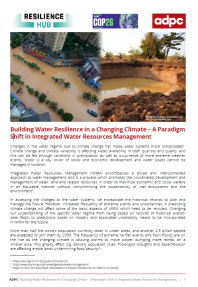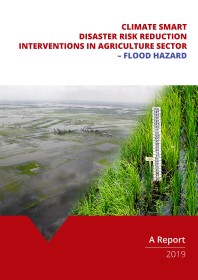- About Us
-
Who we are
-
- Publications
-
- ADPC Academy
-
MediaADPC'S NEWS
Learning to understand the science of climate change Learning to understand the science of climate change
19 - 28 Aug 2013
Bangkok, Thailand
The 5th consecutive international training course on Climate Risk Management in a Changing Environment (CRM-5) will take place on 19 - 28 August 2013 in Bangkok. Organized by Asian Disaster Preparedness Center (APDC), the course will be a unique opportunity for development and disaster risk reduction practitioners from the government, international organizations, UN agencies, NGOs, civil society organizations, and the private sector to gain up-to-date knowledge on climate risk management.
The focus is on the science of climate change, the possible interventions and their integration into development policies.
“The participants will be guided through a number of interactive sessions that will enable them to acquire scientific knowledge to assess climate risks and reduce them strategically. They will learn about climate risk management planning and about implementing and mainstreaming climate risk management into development policies and programs at different levels”, says Senior Training Manager Mr. Sisira Kumara from ADPC’s training services department.
A holistic approach to sustainable development
By harmonizing climate risk management, disaster risk reduction, and development planning the course aims to deliver a holistic approach to sustainable development.
“At the end of the course, the participants will be able to discuss the science, systems, and societal issues of climate change as well as its impacts and linkages with climate induced extreme events. They will also be able to assess specific sector vulnerabilities to climate change in different settings”, Mr. Kumara says.
During the course the participants will even learn to utilize decision support systems for assessing climate impacts, vulnerabilities, and risks.
“They will get to know how to use the tools for designing climate risk management policies, programs, and interventions to reduce climate induced risks”, states Mr. Kumara.
Reducing the risks in central Vietnam
Advisor Ms. Mel Phadtare from the Climate Justice Program of Norwegian Church Aid attended the Climate Risk Management course last year and has since been applying the new skills acquired at the training course in her work. In central Vietnam, agricultural assets and lives are threatened by increasingly intense and frequent typhoons, flooding, sea intrusion, and extreme cold and heat events.
“The skills and knowledge gained at the course have been valuable in our activities with the local rightsholders. Of particular use for our lowland communities has been the concept of climate risk mapping. The course helped me to realize the need to apply climate risk mapping and management as an indicator for our climate change adaptation and disaster risk reduction program. The importance of integrating historical data as well as future scenario planning and early warning systems was also reinforced”, she says.
“Throughout the ten days I had the opportunity to engage with a number of climate change practitioners from around the globe, and I have expanded both my professional and personal networks thanks to the course. I learned much through both the other participants and the course presenters”, Ms. Phadtare adds.
Related PublicationsLatest NewsRelated Trainings
-

